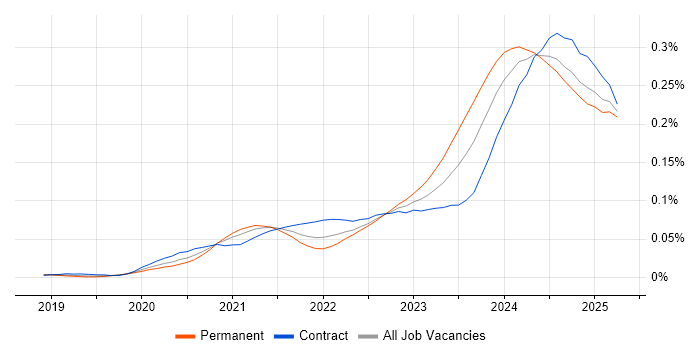Microsoft Power Platform Developer
UK
The median Microsoft Power Platform Developer salary in the UK is £55,000 per year, according to job vacancies posted during the 6 months leading to 5 May 2025.
The table below provides salary benchmarking and summary statistics, comparing them to the same period in the previous two years.
| 6 months to 5 May 2025 |
Same period 2024 | Same period 2023 | |
|---|---|---|---|
| Rank | 565 | 624 | 858 |
| Rank change year-on-year | +59 | +234 | +320 |
| Permanent jobs requiring a Power Platform Developer | 122 | 300 | 107 |
| As % of all permanent jobs advertised in the UK | 0.23% | 0.30% | 0.10% |
| As % of the Job Titles category | 0.26% | 0.32% | 0.11% |
| Number of salaries quoted | 101 | 252 | 76 |
| 10th Percentile | £46,250 | £40,000 | £45,000 |
| 25th Percentile | £51,250 | £48,750 | £50,500 |
| Median annual salary (50th Percentile) | £55,000 | £62,500 | £65,000 |
| Median % change year-on-year | -12.00% | -3.85% | +40.48% |
| 75th Percentile | £65,000 | £72,500 | £72,500 |
| 90th Percentile | £80,000 | £95,000 | - |
| UK excluding London median annual salary | £53,688 | £60,000 | £55,000 |
| % change year-on-year | -10.52% | +9.09% | +57.14% |
All Permanent IT Job Vacancies
UK
For comparison with the information above, the following table provides summary statistics for all permanent IT job vacancies. Most job vacancies include a discernible job title that can be normalized. As such, the figures in the second row provide an indication of the number of permanent jobs in our overall sample.
| Permanent vacancies in the UK with a recognized job title | 47,606 | 93,229 | 94,684 |
| % of permanent jobs with a recognized job title | 90.38% | 94.63% | 91.53% |
| Number of salaries quoted | 27,326 | 66,845 | 59,589 |
| 10th Percentile | £30,000 | £28,500 | £32,500 |
| 25th Percentile | £42,000 | £38,500 | £45,000 |
| Median annual salary (50th Percentile) | £57,500 | £52,500 | £60,000 |
| Median % change year-on-year | +9.52% | -12.50% | - |
| 75th Percentile | £75,000 | £71,250 | £81,250 |
| 90th Percentile | £97,500 | £90,000 | £100,000 |
| UK excluding London median annual salary | £52,000 | £50,000 | £53,000 |
| % change year-on-year | +4.00% | -5.66% | +6.00% |
Power Platform Developer
Job Vacancy Trend
Job postings that featured Power Platform Developer in the job title as a proportion of all IT jobs advertised.

Power Platform Developer
Salary Trend
3-month moving average salary quoted in jobs citing Power Platform Developer.
Power Platform Developer
Salary Histogram
Salary distribution for jobs citing Power Platform Developer over the 6 months to 5 May 2025.
Power Platform Developer
Top 14 Job Locations
The table below looks at the demand and provides a guide to the median salaries quoted in IT jobs citing Power Platform Developer within the UK over the 6 months to 5 May 2025. The 'Rank Change' column provides an indication of the change in demand within each location based on the same 6 month period last year.
| Location | Rank Change on Same Period Last Year |
Matching Permanent IT Job Ads |
Median Salary Past 6 Months |
Median Salary % Change on Same Period Last Year |
Live Jobs |
|---|---|---|---|---|---|
| England | +51 | 114 | £55,000 | -12.00% | 41 |
| Work from Home | +108 | 62 | £55,000 | -12.00% | 30 |
| London | +73 | 60 | £60,000 | -14.29% | 18 |
| UK excluding London | +93 | 52 | £53,688 | -10.52% | 30 |
| Midlands | +32 | 21 | £54,344 | -13.05% | 6 |
| North of England | +48 | 15 | £57,500 | +31.08% | 11 |
| West Midlands | +27 | 14 | £53,688 | -14.10% | 3 |
| South East | +96 | 12 | £48,750 | -42.65% | 7 |
| North West | +2 | 8 | £55,000 | +23.78% | 3 |
| East Midlands | +45 | 7 | £55,000 | +4.76% | 3 |
| Yorkshire | +77 | 4 | £55,000 | +4.76% | 2 |
| South West | +84 | 3 | £60,000 | -14.29% | 2 |
| North East | +43 | 3 | £62,500 | +108.33% | 7 |
| East of England | +30 | 1 | £43,500 | -20.91% | 1 |
Power Platform Developer Skill Set
Top 30 Co-occurring Skills and Capabilities
For the 6 months to 5 May 2025, Power Platform Developer job roles required the following skills and capabilities in order of popularity. The figures indicate the absolute number co-occurrences and as a proportion of all permanent job ads featuring Power Platform Developer in the job title.
|
|
Power Platform Developer Skill Set
Co-occurring Skills and Capabilities by Category
The follow tables expand on the table above by listing co-occurrences grouped by category. The same employment type, locality and period is covered with up to 20 co-occurrences shown in each of the following categories:
